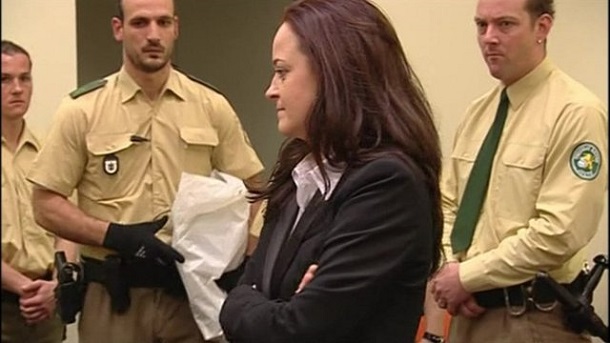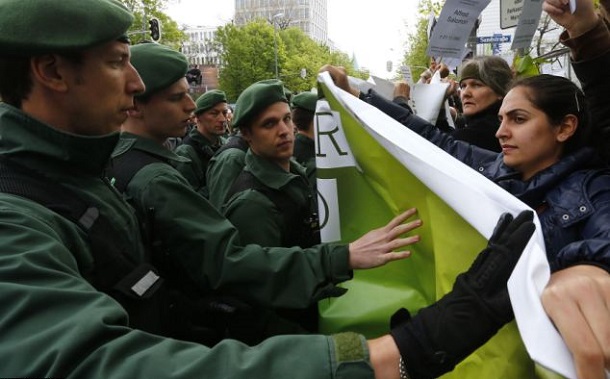The surviving member of a neo-Nazi cell blamed for a series of racist murders in Germany goes on trial in Munich.
The trial opened amid tight security in the southern city of Munich after a three-week delay over an outcry about media access which has further undermined Germany’s image on top of fundamental security flaws exposed by the murder spree.
Under a heavy police presence, chief defendant Beate Zschäpe, 38, entered the Munich court just before proceedings began, appearing relaxed and with her arms folded, while dozens of anti-racist protesters shouted slogans outside.
The trial will focus on 38-year-old Beate Zschaepe, who is charged with complicity in the murder of eight Turks, a Greek and a policewoman between 2000 and 2007.
She is also accused of involvement in at least two bombings in immigrant areas of Cologne and 15 bank robberies carried out by her accomplices Uwe Mundlos and Uwe Boenhardt.
Both men died in an apparent murder-suicide in November 2011
Many people, including reporters had lined up outside overnight to claim one of the 50 free courtroom seats for the first day of the high-profile trial whose significance extends far beyond the murders.
Zschäpe faces charges linked to 10 mostly racially motivated murders over a seven-year period as the last surviving member of a killer trio, most of whose victims were of Turkish origin.
She is the last surviving member of a neo-Nazi trio whose random discovery in November 2011 forced the country to re-assess its image of having learnt the lessons of its Nazi past.
Germany has not seen a terror trial of this scale since members of the prominent left-wing militant group, the Red Army Faction, were sentenced 36 years ago.
German Neo-Nazi Murders:10 People were Killed most of Turks
Zschäpe is charged with complicity in the murders of eight ethnic Turks, a Greek immigrant and a German policewoman between 2000 and 2007. She is said to be one of three central members of the far-right gang dubbed the National Socialist Underground (NSU).
She is also accused of involvement in 15 armed robberies, arson and attempted murder in two bomb attacks.
Her lawyers deny she was directly involved in murder. Zschäpe has remained silent during her 18-month custody and supposedly has no plans to break her silence during the hearing which could last more than two years.
Dressed in a black jacket, white shirt and wearing large hoop earrings, Zschäpe entered the courtroom before the hearing got under way and stood with her back to the TV camera.
She faces life in prison if convicted. Four men alleged to be accomplices will also go on trial on lesser charges.
For the victims’ families, the opening day of the highly-anticipated trial will be their first chance to see the accused in person, as they seek answers to why their loved ones were gunned down.
Lawyers for Semiya and Kerim Simsek, whose father was the first victim, said in a written statement their clients who are co-plaintiffs would be seeking many answers from the trial.
“They want to know why their father was murdered. How they came upon the flower seller Enver Simsek? Did local neo-Nazi networks help in the victim selection?” they said.
Germans were stunned to learn in November 2011 that home-grown racist killers were behind the unsolved murders – and not the foreign criminal gangs that police and the media had always assumed were to blame.
Anger was stoked by revelations that the security forces failed to home in on the killers for more than a decade, and an admission that files had been shredded that could have helped the investigation.
Lawyers for some of the victims’ relatives, who are co-plaintiffs, said, apart from a conviction, they wanted a clear naming of those who also bore responsibility.
Berlin last month apologised before the UN Human Rights Council for mistakes in probing the NSU murders which the government’s top official on human rights described as “one of the worst human rights abuses in recent decades” in Germany.
As most of the victims originated from Turkey, the trial will be intensely scrutinised beyond Germany’s borders.
A controversy over the accreditation of journalists overshadowed the run-up to the trial after the court initially failed to guarantee Turkish media seats when it handed out reserved spots on a first-come, first-served basis.
This strained German-Turkish ties and forced a last-minute postponement when Germany’s top court ordered it to allocate seats to foreign reporters, leading to the final 50 media organisations being chosen in a lottery.
Turkish media now have four seats but several leading German newspapers missed out.
[adrotate banner=”54″]




